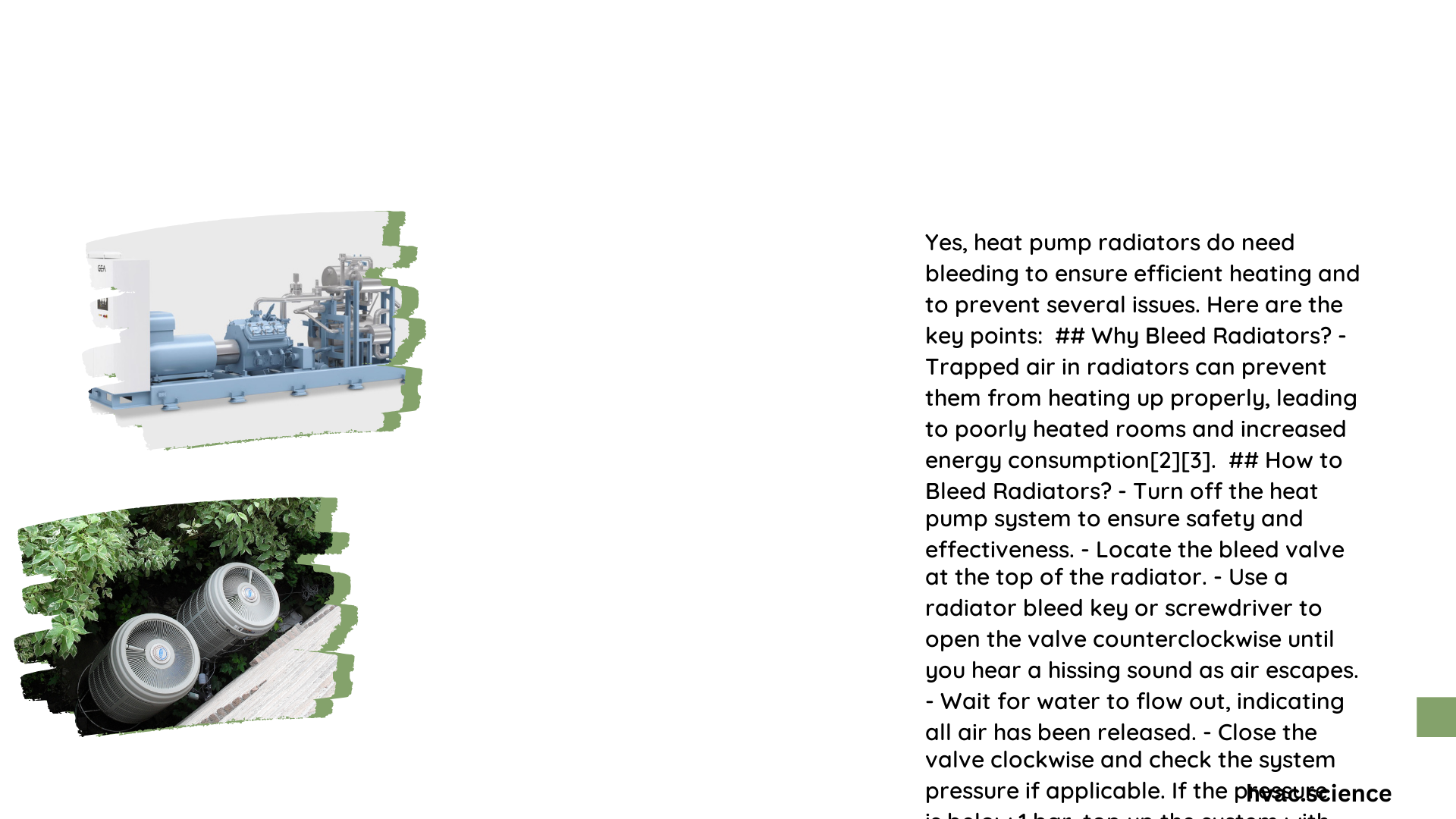Heat pump radiators, like traditional radiators, require bleeding to maintain optimal performance. Air can accumulate in the system, causing inefficiencies and uneven heating. Regular bleeding ensures proper circulation of hot water, improves energy efficiency, and extends system longevity. This article explores the necessity of bleeding heat pump radiators, signs indicating the need for bleeding, and the step-by-step process to effectively bleed your radiators.
Why Do Heat Pump Radiators Accumulate Air?
Heat pump radiators can accumulate air due to several factors:
- Natural byproduct of heating and cooling cycles
- Micro-leaks in the system
- Dissolved air coming out of solution as water temperature changes
- Introduction of air during maintenance or repairs
This air accumulation can lead to:
- Reduced heating efficiency
- Uneven temperature distribution
- Increased energy consumption
- Potential damage to system components
What Are the Signs That Heat Pump Radiators Need Bleeding?

Recognizing the signs that your heat pump radiators need bleeding is crucial for maintaining an efficient heating system. Look out for these indicators:
- Uneven heating: Cold spots on radiators, especially at the top
- Gurgling or bubbling sounds: Noises from radiators during operation
- Reduced heat output: Radiators feel cooler than usual
- Increased energy bills: Higher costs due to system inefficiency
- Longer heating times: System takes longer to reach desired temperature
If you notice any of these signs, it’s time to consider bleeding your heat pump radiators.
How Often Should Heat Pump Radiators Be Bled?
The frequency of bleeding heat pump radiators can vary depending on several factors:
| Factor | Recommended Bleeding Frequency |
|---|---|
| New installation | After 2-3 weeks of operation |
| Regular maintenance | Annually, before heating season |
| Frequent issues | Every 3-6 months |
| After system repairs | Immediately following work |
It’s generally advisable to check your radiators at the start of each heating season and bleed them if necessary.
What Tools Are Needed for Bleeding Heat Pump Radiators?
To bleed your heat pump radiators effectively, you’ll need the following tools:
- Radiator bleed key or flat-head screwdriver
- Small container or cup to catch water
- Old towel or cloth
- Gloves (optional, for protection against hot water)
Ensure you have these tools ready before starting the bleeding process.
What Is the Step-by-Step Process for Bleeding Heat Pump Radiators?
Follow these steps to bleed your heat pump radiators:
-
Turn off the heat pump system: Allow radiators to cool for at least an hour.
-
Identify the bleed valve: Locate the small valve at the top corner of each radiator.
-
Prepare for water collection: Place a container under the bleed valve and have a towel ready.
-
Open the bleed valve: Use the radiator key or screwdriver to turn the valve counterclockwise slowly.
-
Listen for air release: You’ll hear a hissing sound as air escapes.
-
Wait for water: Close the valve immediately when water starts to flow steadily.
-
Repeat for all radiators: Start from the lowest floor and work your way up.
-
Check system pressure: Ensure the pressure is within the recommended range (usually 1-2 bar).
-
Turn the system back on: Restart your heat pump and check for proper operation.
What Are the Benefits of Regular Radiator Bleeding?
Regular bleeding of heat pump radiators offers several advantages:
- Improved energy efficiency: Proper circulation reduces energy consumption.
- Enhanced comfort: Eliminates cold spots and ensures even heating.
- Reduced noise: Minimizes gurgling and bubbling sounds.
- Extended system lifespan: Prevents corrosion and damage from air pockets.
- Lower operating costs: Efficient operation leads to reduced energy bills.
Can Bleeding Heat Pump Radiators Solve All Heating Issues?
While bleeding can resolve many common heating problems, it’s not a cure-all solution. Some issues that bleeding may not solve include:
- Faulty heat pump components
- Incorrectly sized radiators
- Poor insulation in the property
- Malfunctioning thermostats or controls
If bleeding doesn’t improve your heating system’s performance, consult a professional HVAC technician for a thorough inspection.
What Precautions Should Be Taken When Bleeding Heat Pump Radiators?
To ensure safety and effectiveness when bleeding heat pump radiators:
- Always turn off the system before bleeding
- Use proper tools to avoid damaging the bleed valve
- Be prepared for water spillage
- Bleed radiators when they are cool to avoid scalding
- Check system pressure after bleeding and top up if necessary
- If unsure, seek professional assistance
By following these precautions, you can safely maintain your heat pump radiator system and ensure optimal performance.
